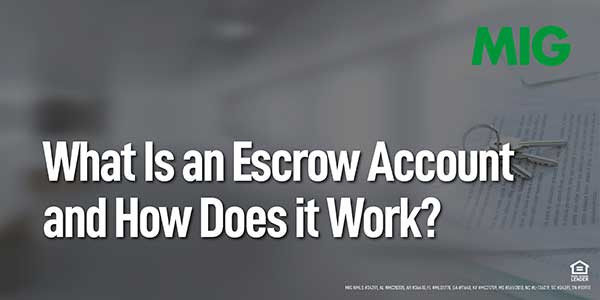
What Is an Escrow Account and How Does it Work?
The homebuying journey is bound to introduce you to all sorts of jargon you don’t normally use, such as credit utilization, bad credit home loans, and debt-to-equity ratios. One term you’ll certainly hear is escrow account. Understanding what an escrow account is and how it fits into your homeownership plans is important. We explain everything you need to know about escrow and escrow accounts below.
What Is an Escrow Account? An escrow account is maintained by the mortgage lender to collect tax and insurance payments that are not part of the home loan. Homebuyers pay into it with a portion of every monthly mortgage payment so lenders can distribute payments for taxes and insurance on the homeowner’s behalf.
Is There a Difference Between an Escrow Account and Escrow? Yes, these terms are different and play separate roles during the homebuying journey. An “escrow account” is set up at closing for the purpose listed above. “Escrow” refers to a process at the beginning of the purchasing process. When a homebuyer decides to make an offer on a property, it’s customary to pay what is called “earnest money” to show a serious commitment to buy the property. This can be 1% or more of the home price. Earnest money is held in escrow until closing and is then refunded to the buyer.
How Does an Escrow Account Work? Your lender adds up your property’s yearly taxes and insurance. If you had to get private mortgage insurance (PMI), that will be added in, too. The total is divided by 12 months, and that amount is added to your monthly mortgage payment. This portion of your payment goes into your escrow account. When your taxes and insurance come due, the lender makes a withdrawal and pays them on your behalf.
Why Are Escrow Accounts Necessary? Lenders naturally want to protect their investment, and escrow accounts help them do that. For example, if the homebuyer was responsible for paying his own insurance and let it lapse, and the house burned down, the lender could lose its money. Also, if the homebuyer got behind on his taxes, a lien would be placed on the property that would take precedence over the lender’s. An escrow account erases these scenarios from playing out, protecting the lender.
Could My Escrow Payment Ever Change? It’s likely over the course of your mortgage to see a change in your escrow payment. Over time, taxes and insurance premiums may increase, causing the need for more money to cover them. The increase will be divided into 12 portions and added to your monthly mortgage payment. In rare cases, the amount will decrease. Your lender will analyze your escrow every year and adjust your payment amount accordingly.
As with every part of the homebuying and mortgage process, it’s smart to understand each area and how it affects you. Now that you are educated on escrow accounts, you can feel more confident in making decisions and moving forward to secure your newly purchased property.



